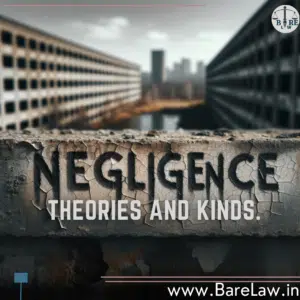Simplifying Your Life & Law | Legal Drafting services
Case Name- Town Area Committee and Ors. vs Prabhu Dayal and Anr.
Citations- AIR 1975 All 132
Introduction- the case mainly revolves around the U.P. Municipal Act and the maxim “damnum sine injuria”. The case is in relation to the construction and demolition of buildings. For proving malice, it is necessary to prove some of the essential presents in the act. So that, not every person may demand compensation for any act defining it as malice. The case will make the concept clearer and how the court dealt with the issue at that time.
Facts– the plaintiff in the case had constructed around 16 shops. The shops were constructed in a building that has an old foundation. However, the construction was demolished by the defendants after some time. The demolition of the shops is being said as illegal by the plaintiff as some of the provisions of the U.P. Municipal Act were not followed while doing so. Also, it has been stated that when the demolition took place, the plaintiff was not informed about it beforehand and at the time of demolition, the plaintiff was not present in the town. Because of this, the plaintiff did also not get a chance of stating his side. However, the defendant states that reasonable time was given to the plaintiff for pausing his construction as it was being done without complying with the legal statutes. The notice of demolishing the construction was first served on December 18th but, no action was taken by the plaintiff. Therefore, an order was passed by the District Magistrate for taking action by the Town Hall Committee (Plaintiff). And then also no actions were taken, then the demolition took place after 21st December. Also, the demolition was done legally.
Aggrieved by the act of demolition, the plaintiff filed a suit against the defendant and challenged the act as it caused loss to the plaintiff.
Issues Raised-
- Can a legal injury be suffered by a person due to an illegal act?
- Can a person get a relief without suffering nay legal injury?
Laws Incorporated:
In this case, the U.P. Municipal Act was mainly referred to. The provisions stated by the parties are as follows- Section 178, 180, 185, 186
Provincial Small Courts Act- Section 15
Maxim Referred to-
Damnum Sine Injuria- the legal maxim states the damages or injury caused to a person in which no infringement of any legal right takes place. These damages are generally the ones that do not any of the fundamental or legal rights of a person. In some instances, it becomes really important for a plaintiff to prove that he has suffered a loss of legal right to claim damages.
The contention of the Plaintiff
The plaintiff in the present case states that the construction of the shops was legal. However, the demolition of the shops has been done illegally as the notice that was served to him as per Section 186 of the U.P Municipalities Act is bad as according to it the plaintiff had only the time period of two hours for demolishing the buildings. Therefore, the legal procedure has not been followed by the defendant.
The contention of Defendant-
The defendants contend that the construction done by the plaintiff is illegal as no notice was issued under Section 178 of the abovementioned Act. Also, there has to the issuance of sanctions for such kinds of constructions and the same was not obtained by the plaintiff as per Section 186 of the abovementioned Act. Also, the demolition was said to be legal as sufficient time was provided to the plaintiff and even after the issuance of several orders and notices, the construction was not paused by the plaintiffs. Then, at last, the defendants started with the act of demolition.
The decision of Trial Court-
The trial court held the plaintiff guilty of not complying with the rules of construction and the construction was done without following the laws. Also, it was held that the defendants had the right to demolition, and also they were provided with plenty of time for demolition. Therefore, after holding the plaintiffs guilty of the act, the suit was dismissed. The plaintiff then opted for appeal.
The decision of the Appellate Courts
The first appellate court held the defendants guilty for demolishing the shops with malicious intention. A decree of damage was provided to the plaintiff. However, the other defendants filed another appeal. The court here stated that the first appellate court has misdirected itself as malice cannot enter a scenario unless and until any illegal act of the defendant has caused loss to the plaintiff.
The plaintiff must prove that an injury has been suffered by him as the court does not entertain any illegal or no legal injury. Section 186 of the abovementioned act gives a right to the defendant to demolish the building in any needful circumstance. The same has been done and also plaintiff here fails to prove that any legal injury has been suffered by him. Therefore, the plaintiff is not entitled to any compensation.
Reasoning
The reasoning given by the court revolves around the maxim damnum sine injuria. For proving a legal injury, the term injury has to be correctly interpreted. It is necessary to state whether a person has actually suffered any legal loss or not. As in the present case, the demolition was the legal right of the defendant and the plaintiff cannot claim damage as the construction did not comply with the legal formalities.




